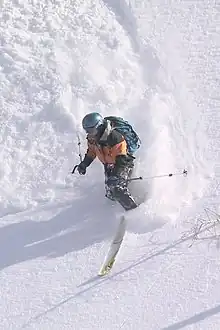Powder skiing is a recreational activity that involves skiing ungroomed trails located inside of avalanche control or ski patrol boundaries.[1]
History
In the Rocky Mountain Range area of the Western United States, powder skiing is a common term used among expert skiers. Alf Engen, an early contributor to constructing 27 ski resorts in the Rocky Mountain Range, is regarded as the pioneer of powder skiing.[2][3] The skiing public at Alta Ski Resort first started in the 1940s.[4] Powder skiing and general skiing techniques, such as the Alberg technique, can be categorized by the fall line.
.jpeg.webp)

Technique
The powder skiing technique is a broad term with a wide range of sub-techniques. Powder skiing requires having equal balance from side to side to stay upright.
Alpine
Alpine skiing techniques, used on groomed trails, can be modified for skiing in powder snow by lifting skis to create "float."[5] Accepted good forms include having knees bent and leaning backward into the ski boots.
While turning, the thigh and hip areas of a powder skier's legs act as shock absorbers. Each shock-absorbing turn in powder creates a rebound by pushing on the snow to slow down and releasing that force to speed up. This type of momentum control is the opposite of wide turns and cutting into the snow. Turning the skis in powder decreases speed and is also an opportunity to change the direction that the skis are pointing down the mountain.[6]
Tip and Turn
Using the Tip and Turn technique, one is less likely to get injured.[7] Begin by bouncing rhythmically in the snow while maintaining a straight trajectory. This bouncing causes one's leg muscles to flex and extend subconsciously. During the extension phase, the skis are pushed into the snow while they rise to the surface during flexion. Then they turn by raising one foot and tilting it towards the outer edge of the ski while keeping one's legs pressed together, and they repeat the process.
Leaning back in powder to maintain momentum and bring ski tips to the surface in deep snow can lead to discomfort. Shaped skis with wide front ends make the skis rise to the surface so that the skier does not have to lean back.[8]
Dipsy Doodle
The Dipsy Doodle is a technique that was developed in the late 1940s.[4] The "Dipsy Doodle" involves following the fall line and lifting each ski one at a time repeatedly, thus establishing float. The Dipsy Doodle is a trick maneuver popularized years ago by U.S. Olympian Dick Durrance. It has become a Wedeln (tail-wagging) exercise for many skiers.[9]
Equipment
.jpg.webp)
Modern powder ski construction is evolving with changes in optimal weight and durability.[10][11] Powder skis use a design with wide tips and shorter tail lengths. [12]
Powder skis typically feature wide tips, ranging from 140 to 155 millimeters. The tails are slightly more tapered, often within a 125- to 140-millimeter range. This design helps powder skis remain buoyant in snow. The contours and proportions of a ski's tip, waist, and tail can vary among models.[13][14]
References
- ↑ "How to Ski Powder". www.mtnscoop.com. Retrieved 2023-08-04.
- ↑ "Alf Engen | Alf Engen Ski Museum". engenmuseum.org. Retrieved 2023-08-09.
- ↑ "Alf Engen". History to Go. 2002-03-25. Retrieved 2023-08-09.
- 1 2 White, Jack (13 Sep 2016). "The Golden Age of Powder". Powder. Retrieved 22 July 2023.
- ↑ Mathers, Scott (Nov 1993). "Pull your feet up in powder". Skiing. Vol. 46, no. 3. p. 100. ProQuest 229391483.
- ↑ Fielding, Leah (2020-02-07). "How To Ski Powder | A Guide by Ski.com". To The Mountains Blog by Ski.com | News, Weather, Info. Retrieved 2023-08-10.
- ↑ Ekeland, A.; Lystad, H.; Holtmoen, Å.; Nordsletten, L. (30 January 2007). "Injuries in powder skiing". Scandinavian Journal of Medicine & Science in Sports. 6 (6): 337–340. doi:10.1111/j.1600-0838.1996.tb00103.x. PMID 9046543. S2CID 45381702.
- ↑ "How to Turn Skis in Powder: Tips and Techniques - The Ski Lesson". 2023-03-21. Retrieved 2023-08-10.
- ↑ Schaeffler, Willy. "THE NEW WAY TO SKI—Third Lesson: SWING TURNS AND 'WEDELN'". Sports Illustrated Vault | Si.com. Retrieved 2023-08-10.
- ↑ Wu, Qianhong; Sun, Qingjie (October 2011). "A Comprehensive Skiing Mechanics Theory with Implications to Snowboard Optimization". Medicine & Science in Sports & Exercise. 43 (10): 1955–1963. doi:10.1249/mss.0b013e318219480c. PMID 21448088. S2CID 36344614.
- ↑ Wolfsperger, Fabian; Szabo, Denes; Rhyner, Hansueli (2016). "Development of Alpine Skis Using FE Simulations" (PDF). Procedia Engineering. 147: 366–371. doi:10.1016/j.proeng.2016.06.314 – via ScienceDirect.
- ↑ Robinson, Lynne (April 2010). "Meet a Member: Passion for Skiing Shapes Travis Halverson's Career Path". JOM. 62 (4): 0_4. ProQuest 232559610.
- ↑ "Best Powder Skis of 2023 | Switchback Travel". www.switchbacktravel.com. Retrieved 2023-08-10.
- ↑ "How to Ski Powder". www.mtnscoop.com. Retrieved 2023-08-10.